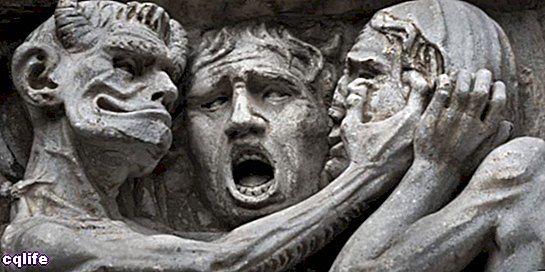We explain what sin is according to the Judeo-Christian tradition, what is original sin and what are the cardinal sins.

What is sin?
A sin is a willful and conscious transgression of a religious law, that is, the act of breaking the commandments proposed by the creed or the doctrine of a religion. Generally, these laws are considered sacred or divine, that is, by the desire or instruction of God to the Humans, and therefore to each sin corresponds some type of punishment or compensation, either in life or in the afterlife.
The word sin comes from latin peccatum, a term that the ancient Romans originally used as synonymous of stumble or mistake, without the same religious connotations, since classical Roman culture revolved around the notion of honor, and not around guilt.
The concept of sin as we understand it today arose with the Christianity, a religion that had roots in Jewish tradition (in Hebrew the word for sin is jattá’th, translatable as "err"). As Christianity became the dominant religion in the West, it began to change the meaning of many Latin words, giving them a new moral, social and religious meaning.
According to the Judeo-Christian tradition, sin must be understood as the distancing of the human being from God, or at least from the path that God has traced for him. However, in the vision of humanity that the New Testament raises, we are all sinners to some extent, and it is precisely the role of religion to offer us comfort and compensation, that is, to return us to the right path through penance and prayer.
At its time of greatest cultural influence in the West and the world, Christianity not only defended this vision of the world, but also developed a whole classification of sins, differentiating them according to their severity, their nature, their motive or their way: there were mortal sins, sins of action and sins of thought, etc.
Thus was composed a moral and cultural code that was of great importance in the history of Europe Y America, which represented the emergence of guilt and atonement as supreme religious values in the West.
The original sin

One of the most important forms of sin in the Christian imagination is the so-called "original sin" or "ancestral sin", from which no human being is exempt. According to this doctrine, human beings carry the blame for our fall from grace and expulsion from paradise, which occurred at the beginning of time, and as a consequence of the first human beings (Adam and Eve) disobeying the law. Will express of God.
According to the biblical account, this disobedience consisted in eating the fruit of the tree of knowledge, which was forbidden by God, offering in exchange the rest of the garden of Eden. Tempted by the serpent, which was a malevolent spirit, Eve ate the forbidden fruit and gave it to Adam as well, and consequently both were expelled from paradise, losing their immortality and being punished with labor and painful childbirth.
The idea of this primal sin arose around the second century, and is attributed to the Bishop of Lyons, Saint Irenaeus (c. 130-c. 202). It has been the object of study, interpretation and debate by different experts and religious authorities of Christianity throughout the centuries, and it is what gives meaning to Christian baptism, a rite with which infants or new Christians are freed from the weight original sin, starting them on the path of redemption.
The deadly sins
In the Christian hierarchy of human sins, capital sins, cardinal sins or mortal sins are the most serious, since they are considered as the sins that generate other sins.
This category of sins has been defined and redefined in the history of Christianity, varying the number and name of the sins: for John Cassian in the 5th century there were eight, while for Pope Gregory I in the 6th century there were only seven. This last vision is the one that has been held to this day.
The cardinal sins are as follows:
- Pride or pride. The most serious and primordial of the seven deadly sins is pride, since it is considered that from it all others are born, in one way or another. It is Lucifer's sin in wanting to dethrone God, and it consists precisely in believing himself more or better than he is, putting himself above God and his divine commandments.
- Go to, anger or rage. Sin understood as excessive anger or inability to contain it, being able to act as a consequence in a violent, intolerant or resentful manner. It is considered a sin because it contradicts the divine mandate of to love to others as to oneself.
- Avarice. A sin of excess, characterized by the irrepressible and insatiable desire to accumulate wealth, or the fear of letting go of one's own, that is, the diametrically opposed to generosity.
- Envy. Similar in nature to greed, it is understood as the insatiable desire for the things of others, reaching the extreme of rejoicing or promoting the misfortune of others, to deprive others of what they possess. It is a sin that goes against the love of neighbor.
- Lust. Sin understood as an excess of sexual desire, or an uncontrolled sexual desire that cannot be satisfied, without pursuing reproduction, but pleasure for the sake of pleasure itself. This sin manifests itself in behaviors such as adultery, promiscuity, or rape.
- Gluttony. This sin consists of the insatiable appetite or thirst, or what is the same, the desire to eat, drink and consume substances (such as drugs) without being thirsty or hungry, pursuing the pure pleasure of consuming. Far from moderation and survival, it expresses itself in behaviors like drunkenness, gluttony, or addiction.
- Laziness. This sin is understood as the inability to take charge of one's own existence, not due to lack of resources, but of motivation or temper. It manifests itself through abandonment and passivity, behaviors that violate the divine order to take care of one's life.
